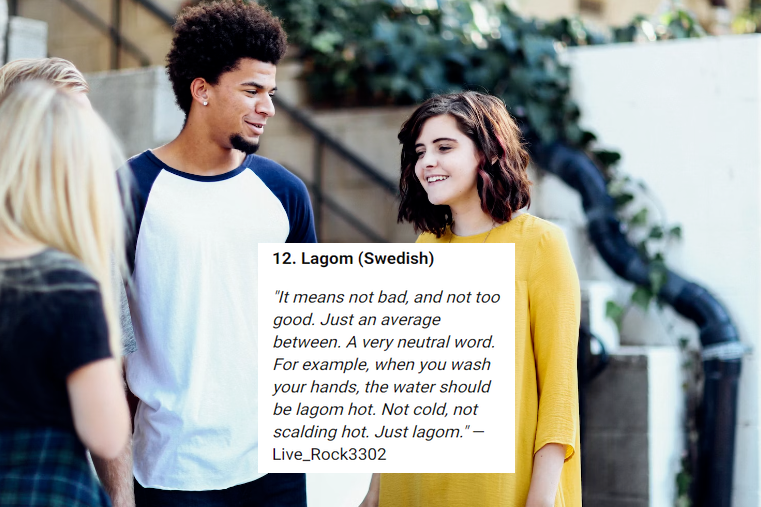Even though humans worldwide share the same senses, feelings, needs, wants and desires, our languages and the ways we communicate have evolved separately, so some languages have phrases and words that have no equivalent in others.
These words often emerge from the unique cultures, histories, and environments that shape each language. It’s like a special secret, a word that captures a feeling, a situation, or an object so precisely that perhaps no other word in any other language can replicate it exactly.
The uniqueness of each language showcases the beauty and diversity of human experiences and perspectives. Moreover, it underlines the delightful intricacy of languages, inviting us to see the world through different lenses and embrace perspectives shaped by differing social nuances. It’s a testament to the vibrant tapestry of human expression.
The difference in languages is a beautiful thing. But it can also be frustrating when one speaks multiple languages and there is no way to express a certain feeling in one language that they can in another.
A Reddit user named Don_Pickelball asked foreign-born people who live in English-speaking countries to share the words that exist in their native language that are sorely missed in English. Here are 15 of the most interesting.
1. Geborgenheit (German)
“In German, we have the word ‘Geborgenheit’ which describes a very specific feeling of feeling cozy and safe and protected. Like you would feel when you’re around loved ones sitting around a fire or when the person you love holds you under the warm covers when it’s raining outside. I tried to explain this to someone the other day and when we googled the translation- it came up with ‘cozyness’ which really doesn’t pay justice to what it actually means.” — Else1
2. Verschlimmbessern (German)
“If you try to fix something but actually make it worse than it was before.” — Chili919
3. Geborgenheid (Dutch)
“It is about feeling safe and sheltered because someone who loves you and cares for you makes sure nobody can hurt you.” — Illimprovement700
4. Komorebi (Japanese)
“It roughly translates as ‘the scattered light that filters through when sunlight shines through trees.’” — tipsy_jana
5. Saudade (Portuguese)
“It has a similar meaning to ‘miss you’ but we have a direct translation for that ‘senti sua falta,’ saudade has more of an emotional feel to it, it’s really hard to explain, it’s deeper than simply missing someone.” — Peddy_D
6. Backpfeifengesicht (German)
“A face in need of a fist.” — No_Tamanegi
7. Estrenar (Spanish)
“To use something for the first time.” — Ratonvacilon23
8. Kuchisabishii (Japanese)
“A Japanese term which directly translates to ‘lonely mouth;’ when you’re not hungry, but you eat because your mouth is lonely.” — MOS95B
9. Kalsarikännit (Finnish)
“Meaning deliberately getting drunk alone at home in your underpants with zero plans of meeting anyone or going out. I think other nations do this as well, but don’t have a word for it. Delightfully relaxing and therapeutic at times, slightly concerning if done excessively. At best a wonderful opportunity to touch base with yourself, your life and your deepest thoughts and feelings. And/or watch that one cheesy comedy from 1992 you love but can’t get any of your friends to watch with you because they have standards. At worst you wake up to an unholy mess accompanied by a killer headache, cheese all over the bed, cryptic messages on ripped up pieces of pizza box cardboard written by you to you all over the kitchen, and have nobody to blame than yourself.” — Fit_Share_6147
10. Chaw-tamaw-tey-quat (Comanche)
“My native language is a Native American language called Comanche and isn’t a written language but the word sounds like ‘chaw-tamaw-tey-quat’ and it basically is a socially acceptable way to say ‘I’m done speaking.’” — SCP-33005
11. Tachiyomi (Japanese)
“Japanese has loads of words that require entire sentences to explain in English. My favorite of all time is tachiyomi, which means ‘standing at a newsstand reading something without any intention of paying for it.’” — the2belo
12. Lagom (Swedish)
“It means not bad, and not too good. Just an average between. A very neutral word. For example, when you wash your hands, the water should be lagom hot. Not cold, not scalding hot. Just lagom.” — Live_Rock3302
13. Luce (Farsi)
“It basically means intentionally acting all cutesy/precious/coy because you think it’s appealing.” — _eviehalboro
14. Sobremesa (Spanish)
“After a meal when you sit around the table talking.” — KommieKoala
15. Załatwić (Polish)
“It means to get something done using connections/ persuasion/ backroom dealings.” — —Loading—

































